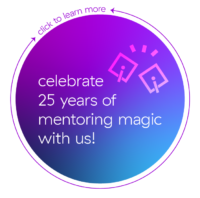In celebration of Black History Month, we sat down with Primo Lasana to discuss the importance of representation and relationships as a Black man in education.
⠀
Primo began his career at iMentor as a Program Manager in the New York City Office. Serving in that role for four years, he later joined the NYC Volunteer Engagement team and then moved to the NYC Development team focused on corporate partnerships. After seven years of dedicated service at iMentor, Primo transitioned to Power of Two, where he worked as the Director of Development and Communications.
⠀
Now Primo’s back and serving as iMentor’s Director of New Site Development. In this role, he will lead the process for cultivating and building new strong relationships with a diverse set of local stakeholders, including potential funders, school districts, corporate partners, and peer nonprofits as iMentor continues its expansion nationally to its fifth site. He received his BA from Hunter College and is currently pursuing an EMPA from New York University.
When did you discover the importance of Black representation within the education system?
⠀
Primo: Black men are tragically underrepresented as educators, and we can see the effects on our community. Case in point, I had no black male teachers from Kindergarten through College Graduation. My dad had a college degree, so I understood somewhere in my brain that Black men could be successful in education. Yet, I didn’t feel that Black men held an important place in education until I got to college. I took a literature course with a Black woman professor in my first year, and I felt like someone was speaking my language for the first time.
⠀
Primo: I believe that being a Black educator is a noble profession and incredibly impactful. At the start of my career, I worked in the public school system of Chicago and saw that the students who felt connected to you, felt connected to their school and futures. From that experience, I learned that relationships were crucial to inspiring young people. iMentor made that concept come to life for me.
⠀
In my role as a Program Manager, I would work with students, and I could see the immediate comfort and pride in their eyes when interacting with someone who looks like them. That first moment of recognition of self in another is immense and incomparable to any other feeling.
How does being a Black man influence your work?
⠀
Primo: I think it’s important that a person of color is representing the organization as we explore new communities and cities to partner with. As a Black man, I have more cultural currency in some spaces, and less in others. It’s a complex path to navigate, and I have to constantly be aware of my identity in every meeting I have. ⠀
⠀
Furthermore, it’s important to have places where you can explore your feelings and be reflective. I’m grateful for the brotherhood that I’ve been able to find through spaces like the Black men’s affinity group. Creating time to affirm each other and lift one another up has been essential when existing in a nonprofit culture that does not always value your experiences or vantage point.⠀
⠀
You recently started a new role at iMentor as Director of New Site Development, what brought you back to iMentor, and what are you looking forward to in this new role?⠀
⠀⠀
Primo: I think that New Site Development is one of the most exciting processes that an organization can go through. I’m looking forward to bringing my experience in program management, mentor recruitment, and development together in this new role. I can’t wait to travel, meet people across the country, and find new communities that can benefit from having the iMentor program. I’ve enjoyed every role I’ve had at iMentor over the past seven years, and I’m already enjoying this one!⠀
⠀
This interview is a part of iMentor’s Black History Month series. Read last years’ features: Creating Tomorrow’s Black Leaders: Q&A with Kelli Doss and Knocking Down Barriers for Black Students in College: Q&A with Shaquinah Taylor Wright.
Learn about iMentor’s mission, values, and commitment to diversity.

